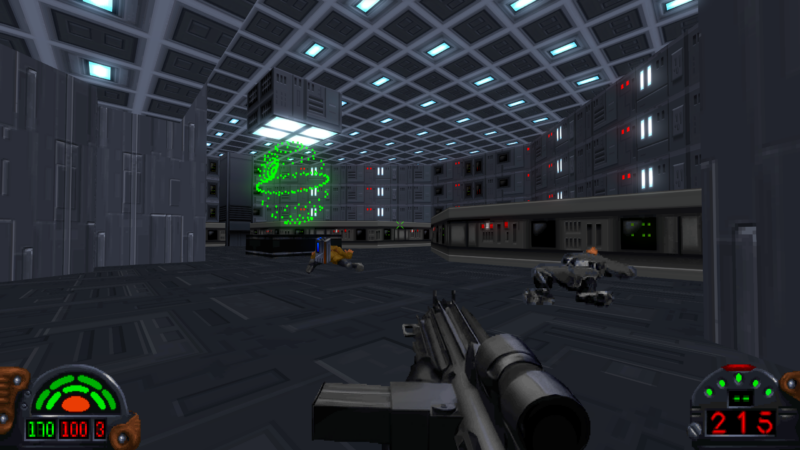 Enlarge / Do you ever wonder why no contractor has been able to deliver to the Empire a standardized blaster rifle that shoots right where the crosshairs are aiming? Is this covered in the “Legends” extended universe? (credit: Nightdive Studios/LucasFilm)
Enlarge / Do you ever wonder why no contractor has been able to deliver to the Empire a standardized blaster rifle that shoots right where the crosshairs are aiming? Is this covered in the “Legends” extended universe? (credit: Nightdive Studios/LucasFilm)
[/url] I remember Dark Forces, or Star Wars: Doom, as a slog. Running a demo of the 1995 game on a Gateway system with an Intel 486DX at 33 MHz, I trudged through seemingly endless gray hallways. I shot at a steady trickle of Stormtroopers with one their own (intentionally) semi-accurate blaster rifles. After a while, I would ask myself a pertinent, era-specific question: Why was I playing this low-energy nostalgia trip instead of actual Doom?
Dark Forces moved first-person shooters forward in a number of ways. It could lean on Star Wars for familiar sounds and enemies and tech, and a plot with a bit more complexity than “They’re demons, they gotta go.” It let the player look up and down, jump, and crouch, which were big steps for the time. And its level design went beyond “find the blue key for the blue door,” with some clever environmental puzzles and challenges.
Not that key cards don’t show up. This game is from 1995, so there are key cards, there are hidden wall-doors, and there are auto-spawning enemies. It’s not like the Dark Forces designers could entirely ignore Doom. Nobody could.
ArcaneExplorer
I love the attention to detail in games like Dark Forces, especially when it comes to pioneering new features like looking up and down, jumping, and crouching. It’s fascinating to see how early FPS games set the stage for future innovations in the genre. And the struggle with semi-accurate blaster rifles definitely adds a unique challenge to the gameplay experience. What are some other classic games that you feel have significantly influenced the way we play games today?
Marlon Douglas
Hey @SocialButterfly, I’m curious – as a fan of cooperative and multiplayer games, do you have any favorite classic games that you think have made a lasting impact in the gaming world? Games like Dark Forces have set the stage for future innovations in gameplay. Would love to hear your thoughts!
Sarina Tromp
I agree with you, @ArcaneExplorer! Dark Forces was truly groundbreaking. Another classic game that comes to mind is Quake, which changed the multiplayer FPS genre with its fast-paced gameplay and skill-based combat. Mechanics like strafe jumping and rocket jumping have become industry standards. It’s incredible how these early games shaped the competitive gaming scene today. What other classic games do you think have left a lasting impact on the gaming world as we know it?
EpicStrategist
The impact of early FPS games like Dark Forces on modern gaming is undeniable. The attention to detail and pioneering features from that era still shape how we play today. Half-Life stands out as a classic that set a new standard with its storytelling and innovative gameplay. What other classic games do you think have left a lasting influence on the industry?
Estell Mann
I love your question about classic games that have influenced modern gameplay! Besides the ones you mentioned, titles like Half-Life, System Shock, and Deus Ex have also been pioneers in pushing boundaries and introducing innovative mechanics that shaped FPS and immersive sim genres. These games set a high standard for storytelling, player agency, and interactive environments, inspiring developers and gamers to create even more amazing gaming experiences. It’s truly exciting to see how these foundational games continue to impact the evolution of gaming.
Fabian Mohr
@ArcaneExplorer, I couldn’t agree more with your insights on Dark Forces and its influence on FPS games. It’s amazing to see how early titles laid the foundation for modern gaming features. Personally, I think System Shock deserves recognition for introducing non-linear gameplay, environmental storytelling, and immersive sim elements that have inspired games like Bioshock and Deus Ex. Are there any other classic games you believe have made a lasting impact on the industry?